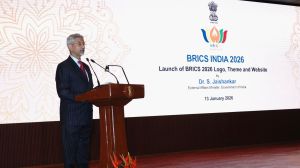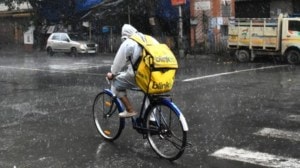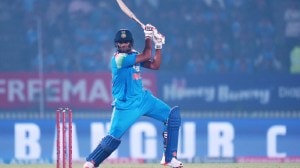The winning equation
Sound alliance arithmetic and a well-orchestrated campaign pushed the DMK-led alliance across the finishing line. But the real test is still to come

A strong combination of allies, a desire for change and a bewildering range of freebies. Combined with a well-orchestrated campaign, it pushed the DMK-led Democratic Progressive Alliance across the finishing line first in the 13th Assembly election in Tamil Nadu. But the race was so close that for the first time, the state has a minority government with outside support.
The winds of change which swept across the state were rather gentle as was obvious in the slender victory margins in most of the 234 constituencies. But in the toughest battle ever in which the ruling AIADMK and its leadership was untroubled by the anti-incumbency factor, the 4.63 crore voters across the state preferred to plump for the DMK and its allies.
Despite the exit of the MDMK8217;s Vaiko from the DPA, it was the alliance arithmetic of the DMK-led five-party alliance that finally broke the emotional chord that AIADMK8217;s J Jayalalithaa managed to strike with voters. Amma streaked across the state, launching her party8217;s 8216;feel good8217; campaign a good 10 days before her rivals, listing out her government8217;s achievements, though belated after her party8217;s debacle in the 2004 Lok Sabha election.
When DMK chief M Karunanidhi was still ironing out the ruffles in the DPA while apportioning the seats, Jayalalithaa quickly sewed up her three-party alliance, including the MDMK and Dalit Panthers of India, led by Thol Thirumavalavan, and raced ahead covering quick ground and focusing only on the highlights of her largely scandal free five-year regime.
Leaving it to Vaiko and Thirumavalavan to keep up a spirited attack on her rivals, the normally reticent Jayalalithaa opened up to the media, selectively choosing a television news channel every other day on her campaign trail to attack her rivals. Occasionally she would issue a statement, like she did against Union Minister, Dayanidhi Maran, demanding that he be dropped from the Union Cabinet for his alleged 8216;8216;arm twisting tactics8217;8217; against the Tatas. But her campaign was largely free of any attacks against her opponents.
THOUGH making a late start, the DPA launched a coordinated campaign in almost every rural constituency with powerful orators, including Karunanidhi, clearly the star campaigner, Union Minister, P Chidambaram and Left party leaders, R Nallakannu and T Pandian. Karunanidhi8217;s son, M K Stalin and Dayanidhi Maran, also charted their own programme, fanning out across the state, whipping up controversial issues during Jayalalithaa8217;s rule which helped the DPA to decimate her AIADMK in the 2004 Lok Sabha election.
They raked up Karunanidhi8217;s dramatic midnight arrest, which had evoked a lot of sympathy across the state, the arrest and dismissal of 12 lakh government employees and the controversial anti-conversion Bill. Sun TV repeatedly showed visuals of Karunanidhi8217;s arrest.
But as Chidamabaram put it, the other 8216;nayagan8217; hero of the DPA victory was the DMK8217;s poll manifesto. The party8217;s offer of free colour televisions for the poor, Rs 2 per kg of PDS rice and land for the landless farmer, caught the fancy of the voters particularly when Karunanidhi and later Chidamabaram took pains to explain that the burden on the exchequer in implementing these promises was not heavy.
Jayalalithaa, who initially ridiculed the freebies as 8216;8216;not financially feasible,8217;8217; hastily joined in, spreading out her own bag of goodies. However, it was the lack of strong allies on her side which preyed on the AIADMK8217;s prospects. Spurning offers of tie-ups with actor Vijayakant and his DMDK and actor Kartik, who heads the state unit ofthe All India Forward Bloc, proved costly for Amma. Finally, what finished off the AIADMK was the combined strength of the DMK-led alliance and its spread out pocket boroughs.
But behind all that jubilation, it is a worried DMK leadership that is quietly taking stock of its wins and losses. The AIADMK did not do too badly for itself, polling 39.83 per cent of the votes, just a little over five per cent short of the DMK which polled 44.58 per cent of the votes. In fact, demitting office, an undeterred Jayalalithaa declared that she was stepping down 8216;8216;without the slightest tinge of sadness.8217;8217; Even while savouring the DPA8217;s success, it is a worried Karunanidhi who is taking charge of the state, knowing well that it may not be too long before Jayalalithaa makes a comeback, perhaps even by the next Lok Sabha election in 2009.
- 01
- 02
- 03
- 04
- 05































